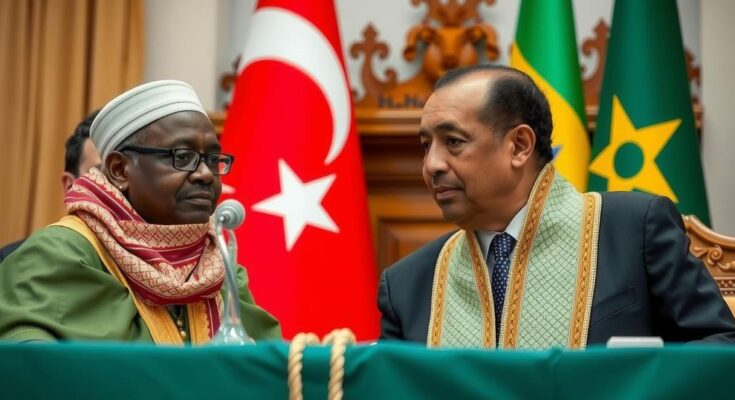Turkey will host talks between Somali President Hassan Sheikh Mohamud and Ethiopian Prime Minister Abiy Ahmed, aiming to resolve a dispute over Ethiopia’s port access. Tensions escalated following Ethiopia’s agreement with Somaliland, seen as a threat to Somali sovereignty. Turkey has been strengthening its partnership with Somalia through military agreements. The upcoming talks may provide an opportunity for diplomatic resolution as both sides consider reciprocal concessions.
Turkey is preparing to facilitate negotiations this week between Somali President Hassan Sheikh Mohamud and Ethiopian Prime Minister Abiy Ahmed, focusing on a protracted dispute regarding Ethiopia’s need for access to ports in the Horn of Africa. Reports indicate that President Mohamud is expected to engage in direct dialogue with Prime Minister Ahmed during this visit. While the Turkish Foreign Ministry has refrained from commenting, the Ethiopian embassy in Ankara has similarly declined to provide any statements concerning the forthcoming discussions.
The tensions between Somalia and Ethiopia were exacerbated earlier this year when Ethiopia signed a naval agreement with Somaliland. This development was perceived by Mogadishu as a threat to its sovereignty, as it was seen as a step toward recognizing Somaliland’s self-declared independence. In response, Turkey, which has established a robust political and security framework with Somalia, entered into a comprehensive naval agreement with Mogadishu. This accord reportedly encompasses plans for the establishment of a Somali navy and the safeguarding of Somali territorial waters from external threats. It also initiated an energy partnership and welcomed Turkish energy drilling vessels off the coast of Somalia.
Relations between Ethiopia and Somalia have remained fraught, with Somalian officials warning of potential conflict should Ethiopia persist with its naval agreement with Somaliland. Turkey previously hosted two rounds of ministerial-level talks between the two nations this year and has reported progress in these negotiations. Ankara maintains close security ties with Addis Ababa, particularly since supplying drones that bolstered the Ethiopian government during its civil conflict against Tigray forces.
Expectations in Ankara suggest that the upcoming meetings might yield encouraging outcomes. Sources indicate that Somalia might propose granting Ethiopia port access near its border in exchange for Ethiopia retracting the agreement with Somaliland. This situation has become more intricate following Somaliland’s recent presidential elections, which have shifted local political dynamics, particularly regarding Prime Minister Ahmed’s relationship with the new president, Abdirahman Mohamed Abdullahi. If discussions prove fruitful, there is anticipation that Turkish President Recep Tayyip Erdogan may play a pivotal role in resolving the ongoing issues.
The geopolitical dynamics surrounding Somalia and Ethiopia have been increasingly complex, particularly influenced by Ethiopia’s outreach to the self-declared independent region of Somaliland. Somalia perceives this alliance as a direct threat to its sovereignty, prompting Turkey to strengthen its ties with Mogadishu through military and naval agreements. The ongoing tensions have necessitated international mediation, with Turkey positioning itself as a crucial negotiator to foster dialogue and potential resolution between Ethiopia and Somalia, particularly concerning territorial and maritime disputes.
In conclusion, Turkey’s upcoming hosting of leaders from Somalia and Ethiopia represents a significant effort to mediate in a long-standing dispute regarding port access and territorial sovereignty. The recent developments, particularly Ethiopia’s agreement with Somaliland and Turkey’s bolstered partnership with Somalia, have underscored the urgent need for dialogue. Successful negotiations may hinge on potential concessions from both parties, with Turkey’s involvement potentially proving instrumental in achieving a diplomatic resolution.
Original Source: www.middleeasteye.net




